QuestionI've had a male betta fish for about a year. I keep him in a fish bowl with some rocks (I used to have live plants but they eventually became moldy and had to be discarded). When I change his water I add a PH-neutralizer and nothing else. I feed him betta pellets and sometimes blood worms, rarely because I'm usually too lazy to get them out. He's always been doing fine, but one time I fed him some blood worms and changed his water later that day. That evening I found him floating at the top and tilting to one side every time he relaxed, surely a sign of swimbladder disorder. I figured it was because I had probably overfed him and then on top of that he suffered stress from the water change which didn't help. So I fasted him for 2 days and he went back to normal. Then I fed him a bit of pea, and only then started feeding him just a pellet or two at a time, being very careful. I definitely haven't been overfeeding him after that experience. But yesterday I changed his water again (didn't want the loose pea bits to rot in there)... and this morning he is stuck floating at the top again! I really think it can't be constipation/indigestion this time. The only thing that happened was the water change. It makes no sense to me :(
How can I prevent this from happening? I've got to change that water sooner or later and I don't want him to suffer every time that I do.
Thanks in advance for your help.
Kristina
AnswerHi Kristina,
You need a good water conditioner such as Stress Coat or AquaSafe. PH neutralizer won't remove the harmful metals in water. You need a good water conditioner because right now you are putting your betta into chloine, and othe harmful chemicals everytime you change the water.
Here is some information on Bettas, that you may find helpful:
Bettas need 5 gallons of water or more to be healthy, and happy.
In their habitat the betta may live in shallow waters, but they have lots of room to swim.
Keeping Bettas in small bowls, containers, vases, mirror tanks, etc. is cruel. The Betta is one of the most mistreated fish on the market.
They need a heated tank. Temperature should be 78-80 degrees. They are tropical fish, and are cold under this temperature. Cold bettas get sick, are miserable, and live unhappy lives. ( Always remember when heating a tank, do this very very slowly..1 (one) degree every two days, as bringing up the temperature too fast would be deadly to your Betta.) Put your Betta in the same degree water he is in now, and bring the temperature up very very slowly. The temperature should always be stable. Fluctuating temperature is very bad for bettas, and any other fish.
They should have a silk plant in their tanks, so that they can rest on the leaves. They also need a little tunnel or some knick knack that they can go through. One teaspoon to five gallons of diluted aquarium salt may be added to his water.
Aquarium salt helps them with stress, and helps with parasites. However if a Betta is showing signs of a swollen tummy, salt should not be used.
They need a varied diet. This is very important. Betta pellets one day, Betta Flakes the next, Daphnia the next, and bloodworms should be given once a week as a treat.
He should be given one frozen cooked pea a week, and on the day you give him the pea, he should fast.
A betta is prone to constipation, and constipation leads to Swim Bladder Disease. A cooked frozen cooked pea a week keeps them from getting constipated. Always remove the outer layer of the pea, and cut it into small pieces feeding it to your betta one piece at a time.
They should have 2-3 small meals a day, and not one big meal. We must remember that their tummy is the size of their eye.
Example: 2 pellets for one meal.
Water changes are very important. Water changes must be made every week without fail with a good water conditioner such as Aqua Safe or Stress Coat. There is also a conditioner made especially for bettas. If you do not have a filter, change all the water in his tank weekly. Bettas do better without filters in 5 gallon tanks.
Never put two bettas in the same tank, they will kill each other...male or female. The Betta male is a loner. Females can be kept together in a big enough tank, but they are also aggressive towards each other, and the tank should be at least 30 gallons with many hiding places.
When treated well, a betta can live up to 8 years, if you buy him when he is very young. (Unfortunately we do not know their age when we buy them at the Pet Store which is why some bettas die two or three years after we have bought them.)
He's an intelligent little fish, and should be treated with kindness.
Too many vendors know nothing about the betta, and don't care...so don't give good information on how to keep them.
They are there to sell, and will say anything just to make a buck. They send you home with your bought betta, telling you a small bowl is perfect, and bloodworms! The poor customer thinks he has everything he/she needs, and then the fish gets sick, money is spent to cure him, and eventually the fish dies.
This turns my stomach over. Unfortunately there are no laws to protect fish.
Bettas kept in small bowls, one gallon tanks, and vases, will get sick, and are very hard to cure in such little water. They end up dying, and
that hurts the person who has grown so attached to them. They don't deserve to be treated this way.
This is how a Betta should be treated. If treated this way, you will have your friend for a long long time. I breed them, love them, and know what is good for them.
If you have anymore questions, do not hesitate to write me.
Lynda

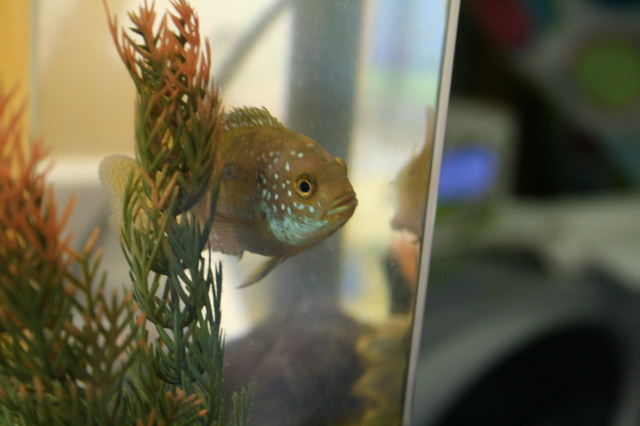 Jack Dempsey?
Question
Jack Dempsey
I have a fish that I bought over
Jack Dempsey?
Question
Jack Dempsey
I have a fish that I bought over
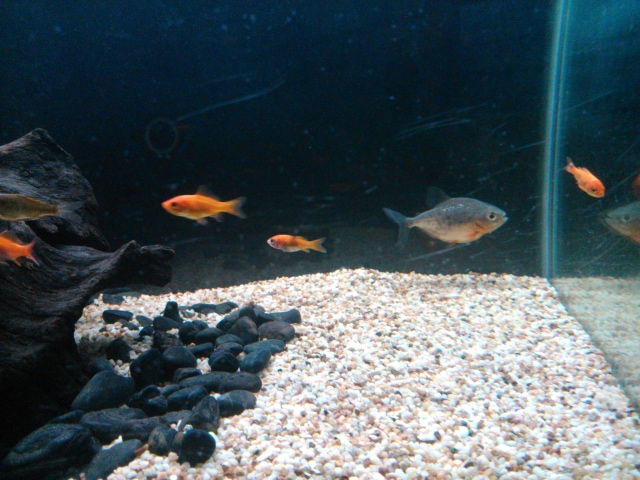 Carnivorous Top Dwellers
Question
This is the Pacu This is the Snakehead,
Carnivorous Top Dwellers
Question
This is the Pacu This is the Snakehead,
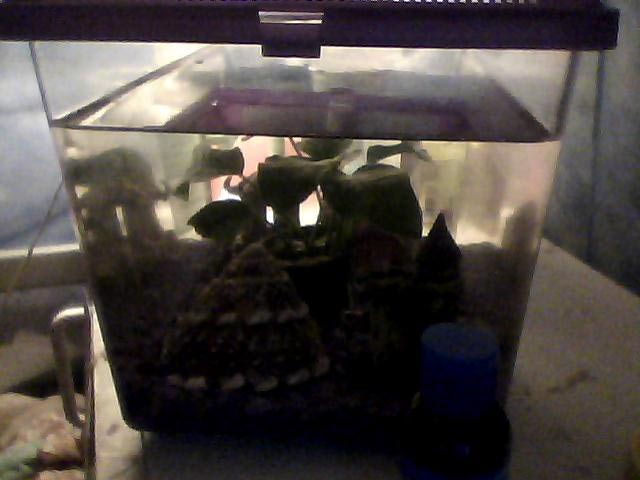 Dying/ Breeding Bettas
Question
Oreo
Ive been trying to breed bettas fo
Dying/ Breeding Bettas
Question
Oreo
Ive been trying to breed bettas fo
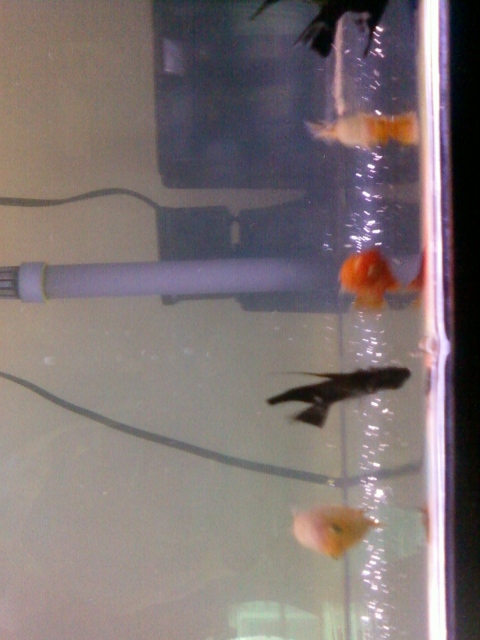 Frustrated Newer tank owner!
Questionmy tank
QUESTION: Hello! Ive had my tank
Frustrated Newer tank owner!
Questionmy tank
QUESTION: Hello! Ive had my tank
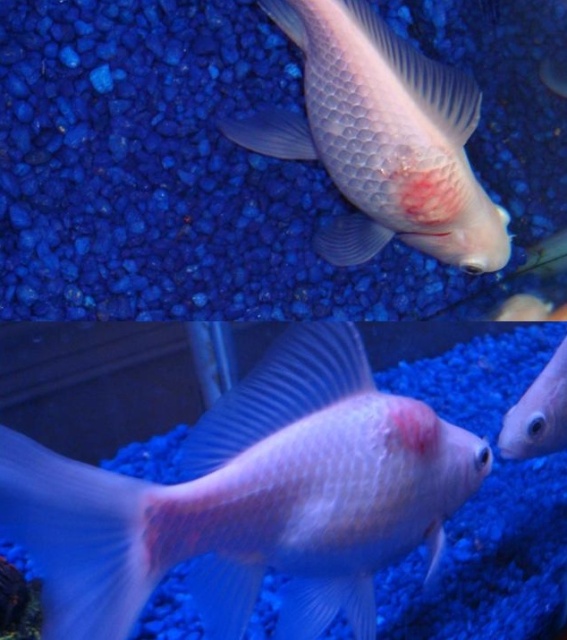 Goldfish with swollen bump near dorsan fin
Question
Goldfish with swollen
Jumbo (see attached pho
Goldfish with swollen bump near dorsan fin
Question
Goldfish with swollen
Jumbo (see attached pho